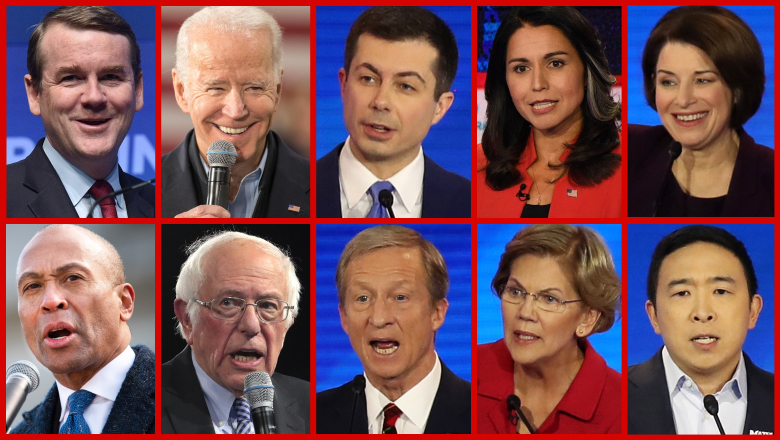
Today, voting is taking place for both the New Hampshire Democratic and Republican primaries. The New Hampshire Democratic Primary should be a much quicker process than the Iowa Caucus was. Since it’s a primary, voters have a longer period of time to show up at their polling locations and vote on the ballot for the 2020 Democratic Presidential nomination. Results should be known later this evening, maybe even before 10 p.m. Eastern. Here’s a look at the time the Republican and Democratic primaries start and end and how long they’ll last today on Tuesday, February 11, 2020.
Some Polls Open as Early as 6 AM & All Will Be Closed By 8 PM Eastern
Unlike a caucus, the Republican and Democratic primaries work like any other election, where people vote at their polling locations during a specified time period.The hours of some polling locations run from 6 a.m. to 8 p.m. Eastern. However, some will open later at 7 or 8 a.m. Eastern, but no later than 11 a.m. Eastern. Thirteen cities can keep their polls open until 8 p.m., but most locations close by 7 p.m.
So in summary, polling locations vary by city and town. The times that the polls open vary from 6 a.m. in early-bird places like Amherst to as late as 11 a.m. Eastern. The majority of locations close at 7 p.m. Eastern, but a few will stay open as late as 8 p.m. One city actually had its polls at midnight, but that’s an exception to the rule.
You can see a full list of polling locations, including towns, addresses, phone numbers, and polling hours, here.
To search for your polling location by town, street name, or street range, you can visit New Hampshire’s polling look-up site here.
The New Hampshire Secretary of State runs the primaries in the state today, not the Democratic or Republican parties.
We Could Start Hearing Some Results as Early as 8 PM Eastern
Gov. Chris Sununu guaranteed that Democratic primary results will be available on Tuesday night on time, Boston Herald reported. Results are typically known within an hour of the polls closing, which means we could know the results as early as 8 p.m. Eastern in some locations, with other locations reporting in by 9 p.m. Eastern. Republican results will likely be known around the same time, but those results come come in quicker depending on turnout.
We’ll likely have a general idea of who won the Democratic primary as early as 10 p.m. Eastern or sooner, depending on how things proceed.
However, the official results won’t be shared until Wednesday. Results will be known fairly quickly once they’re announced by moderators at each polling location. But Secretary of State Bill Gardner’s office won’t announce the official results until Wednesday, February 12, after his office receives them and tabulates them, Union Leader noted.
About the Democratic Primary
The candidates on the New Hampshire ballot for the Democratic primary will include a number who have already dropped out. According to The Green Papers, the list on the ballot includes:
- Michael Bennet
- Joe Biden
- Cory A. Booker
- Mosemarie Dora “Mosie” Boyd
- Steve Bullock
- Steve Burke
- Pete Buttigieg
- Julián Castro
- Roque “Rocky” De La Fuente, III
- John Kevin Delaney
- Jason Evritte Dunlap
- Michael A. Ellinger
- Tulsi Gabbard
- Ben “Gleib” Gleiberman
- Mark Stewart Greenstein
- Kamala Harris
- Henry Hewes
- Amy Klobuchar
- Tom Koos
- Lorenz Kraus
- Rita Krichevsky
- Raymond Michael Moroz
- Deval Patrick
- Bernie Sanders
- Joseph A. “Joe” Sestak, Jr.
- Sam Sloan
- Tom Steyer
- David John Thistle
- Thomas James Torgesen
- Elizabeth Warren
- Robert Carr “Robby” Wells, Jr.
- Marianne Williamson
- Andrew Yang
Candidates are only viable (and can only be allocated delegates) if they earn more than 15 percent of the vote. Delegates will be awarded proportionally. This is not a winner-takes-all state. In addition, this primary is being run by the Secretary of State, unlike the Iowa Caucus that was run by the Iowa Democratic Party. So we likely won’t see many of the issues that Iowa saw today.
About the Democratic Delegates
In New Hampshire Democratic primary, 24 pledged delegates are at stake. The 24 delegates are pledged based on the voting results in the primary, as long as a candidate gets at least 15 percent of the vote.
The state has a total of 33 delegates, so the other nine are essentially superdelegates. They include five DNC members and four Congress members (two Senators and two Republicans).
A National Convention Delegation Meeting in Concord takes place on April 25, 2020.
The Democratic National Convention will take place July 13-16. According to Ballotpedia, there will be 4,750 delegates total, including 3,979 pledged and 771 automatic (more commonly known as superdelegates.) In order to not have a contested convention, a candidate needs 1,991 pledged delegates on the first ballot. (Superdelegates aren’t allowed to vote on the first ballot.) If no candidate gets this majority of pledged delegates, then a second ballot (or more) will take place and both pledged and automatic delegates can vote this time. From then on, a candidate needs the majority of all delegates to win, which is more than 2,375 votes.